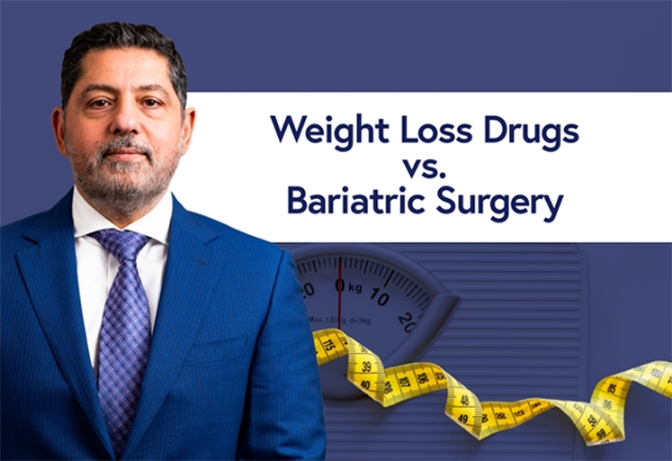Weight Loss Drugs vs. Bariatric Surgery – Which is Right For You?
If you’re trying to lose weight and finding it difficult, you may have considered taking medications or undergoing bariatric surgery. Both of these... read more
Call Us Today (732) 640-5316
E-Waiting RoomGastric bypass surgery called The Roux-en-Y Gastric Bypass is the gold standard of weight loss surgery. Generally, this is minimally invasive surgery also called mini gastric bypass using a laparoscope. This procedure physically changes the stomach and small intestines to reduce the size of the stomach and how you absorb food. The surgery creates a small pouch and connects it directly to the small intestines, bypassing most of the stomach and part of the small intestines where nutrients are absorbed. The stomach pouch is smaller which reduces the number of calories that can be consumed and reduces the absorption of calories and nutrients. Rerouting the food changes the gut hormones which suppresses hunger, improves satiety, and improves how the body uses glucose, to improve the symptoms of type 2 diabetes in people who are obese.
Below are the most frequently asked questions patients ask our board-certified bariatric surgeons at Advanced Surgical & Bariatrics of New Jersey about Gastric Bypass Surgery.
Gastric bypass and other weight-loss surgeries are major, life-changing procedures. While weight-loss surgery can help reduce your risk of weight-related health problems — such as type 2 diabetes, high blood pressure, heart disease and sleep apnea — it can also pose major risks and complications. You may need to meet certain medical guidelines to qualify for weight-loss surgery. You likely will have an extensive screening process in our New Jersey bariatric clinic to see if you qualify.
In general, gastric bypass or another weight-loss surgery could be an option for you if:
In some cases, you may qualify for certain types of weight-loss surgery if your BMI is 30 to 34 and you have serious weight-related health problems.
The amount of weight you will lose depends on a number of factors. These factors include, diet, exercise, lifestyle, and your overall commitment to changing old habits. The size the surgeon makes your stomach and the length of your roux limb can make a small difference in weight loss but most of the time these surgical differences are minor. And today, most surgeons have very similar techniques when they perform gastric bypass surgery further minimizing surgical differences.
But let’s assume that you do everything right after surgery. You’ve changed your diet (gastric bypass forces some dietary changes, this is why gastric bypass creates more weight loss than most other procedures), you’re exercising regularly, and you make an effort to sit less and be active more. How much will you weigh when all is said and done?
Compared to other weight loss surgeries, gastric bypass offers:
Most gastric bypass surgery is laparoscopic, which means the surgeon makes small cuts. That makes for shorter recovery time. Most people stay in the hospital for 2 to 3 days, and get back to normal activities in 3 to 5 weeks.
Gastric Bypass: Doctors recommend that gastric bypass surgery patients take a complete multivitamin, calcium with Vitamin D, iron and Vitamin C, Vitamin D, and Vitamin B12. Others may be recommended.
For those who are obese, gastric bypass can reduce the risk of death by 40 percent over a seven-year period, according to a 2007 study in the New England Journal of Medicine. They found that people who underwent gastric bypass surgery had a 40 percent reduction in the rate of death compared to their obese counterparts.
Managing hunger after weight-loss surgery is one of the most daunting parts of post-bariatric life. In almost every case, except some gastric sleeve post-ops, patients may still feel hungry even if they are full after a meal. This arises because, while the stomach is smaller, the brain may still be used to the patient’s past lifestyle and diet.
This hunger, especially in the first few months after surgery, can make it very difficult to stick to the post bariatric diet and can be a nagging reminder of the lifestyle and diet challenges after weight loss surgery. Stay on track. You can do it.
I love the staff here. They are always so nice and friendly. They definitely make you feel like you’re important and they always are there to answer any questions/concerns. Lexi, did my ultrasound and she was such a sweetheart!! She really made me feel comfortable and was so personable. I felt like I was talking to my best friend. She definitely put my mind at ease on a lot of my concerns. 🙂
Lauren
Dr. Ragui Sadek is a premier surgeon who established a state-of-the-art and one of the safest bariatric surgery programs in the state. Dr. Sadek has fellowship training in both laparoscopic/bariatric surgery and surgical trauma/critical care, allowing him to safely perform complex surgeries on patients who have been turned down by other practices. As a Clinical Assistant Professor of surgery at RWJ Medical School & the Director of bariatric surgery program at RWJ University Hospital, Dr. Sadek offers a cutting-edge range of laparoscopic, robotic, & bariatric surgical procedures with a complication rate substantially below the national average.
Dr. Sadek is a Clinical Assistant Professor of Surgery at Rutgers-Robert Wood Johnson Medical School and a Fellow of the American College of Surgeons. Having performed more than three thousand advanced surgical procedures, Dr. Sadek has established a strong patient satisfaction rate and a solid reputation among the surgical community and is renowned as a top physician in his field by International Association of Healthcare Professionals. As a board-certified surgeon, he holds affiliations with the American Society of Metabolic and Bariatric Surgery and the Society of American Gastro Endoscopic Surgeons. More about Dr. Sadek
Stay current with Advanced Surgical & Bariatrics of New Jersey

If you’re trying to lose weight and finding it difficult, you may have considered taking medications or undergoing bariatric surgery. Both of these... read more

Are you frustrated with your inability to lose weight? Tired of being trapped in an endless cycle of yo-yo dieting, over-exercising, cleanses, and... read more